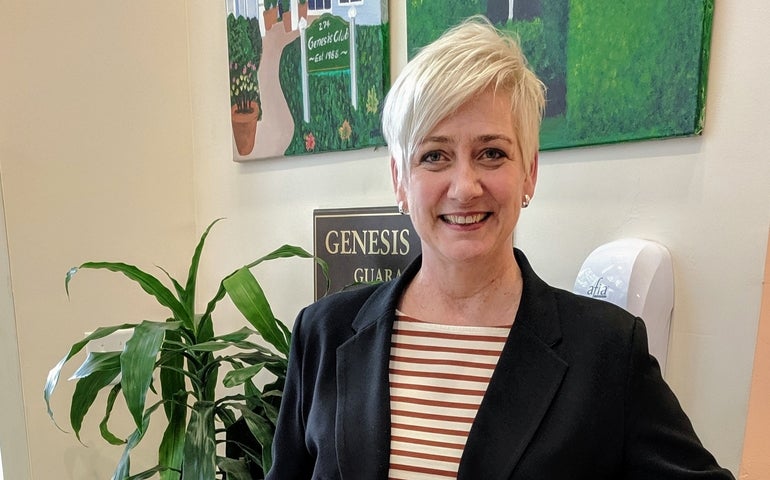Lisa Brennan used to drive by the Genesis Club on Lincoln Street in Worcester when she worked for immigration services for nearby Ascentria Care Alliance. But despite always working in human services, she never knew what the Genesis Club did. That spoke to the club’s understated nature in helping those with mental illness readjust to the workforce – and perhaps to a stigma keeping such services under the radar. Brennan, the Genesis Club’s executive director since last December, has a master’s degree in theology and social policy from Harvard Divinity School, and a bachelor’s degree in community health from Montclair State University in New Jersey. She succeeds Kevin Bradley, who died in 2017 after helping to found the club and run it for nearly three decades. The club, one of roughly 30 such independently run clubhouses across the state, serves roughly 1,000 members from across the Worcester area.
How does the Genesis Club help those with mental illness?
People who attend clubhouses are shown to have better social networks, fewer psychiatric symptoms and fewer hospitalizations. Feelings of isolation and loneliness can often develop into a mental illness, and that’s a huge part of what we address. We have a community here each day, and we go out for events together each Saturday.
How does the club connect people with jobs?
We work a lot with employers like UMass Memorial Health Care, Worcester Polytechnic Institute, AdCare Hospital, Saint-Gobain and others for a range of mostly entry-level positions to help people get back into the routine of working, with jobs like greeters, mail sorting, phone operators, or filing or other administrative type jobs. Some, but not the majority, of people are able to fully recover and go back to their previous work. Some won’t get back fully into the workforce. For those people, they have a community here. They find those jobs or work at the clubhouse itself. We’ve still made a lot of progress. Years ago, you would never re-enter the workforce after a major mental illness incident. Not only was it not expected, but it was discouraged.
Members virtually help run the entire clubhouse. How does that work?
There’s nothing I do every day as an executive director I wouldn’t do alongside somebody else. Practically everything here is done by members, including cooking, paying our bills, applying for grants, shopping for food, you name it.
What attracted you to this job?
When I first came in here and got a tour, I thought, “This is what people talk about when a place is client-oriented.” It felt right from the beginning, with members everywhere interacting with each other and helping to keep this place running. In some ways, the challenge of getting members here into the right positions in the workforce isn’t too different from what I did at Ascentria with refugee and immigrant resettlement, where there are often barriers to finding the right jobs for someone.
What are your plans for the Genesis Club as its new executive director?
There’s nothing I’d change about the model except to build up our infrastructure to be able to do more of it. I’d like to engage more of the community, and have more people come by and see first-hand what we do. We’re starting on a relationship-building campaign again. We’re not always telling our own stories, and I want to do that. We should be talking about our success stories much more boldly than in the past.
This interview was conducted and edited by Worcester Business Journal News Editor Grant Welker.

